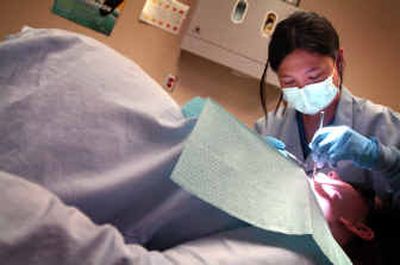Program gives dental care to moms-to-be

Most women complain about the pain of childbirth, but Danielle Kemp felt the worst of it in her teeth.
The 26-year-old stay-at-home mom’s mouth ached immediately after her son was born a year and a half ago. She didn’t have dental insurance, so she just coped with the agony. Finally, Kemp’s mother paid for her care, and the problem disappeared.
Now, Kemp is seven months pregnant with her second child and is tackling her oral health head-on. She is participating in the TERM Project, a program run by the Spokane Regional Health District and paid for by the March of Dimes that provides dental care to pregnant women.
“They shot me in the right direction,” Kemp said of the health district during a dental exam Thursday. “There’s no way otherwise” to pay.
In 2004, the district tracked 68 pregnant women, monitoring their oral health and birth outcomes. The district found that women who received periodontal care gave birth to infants about half a pound heavier than women who didn’t receive treatment.
The district’s results mirrored national studies that have linked low birth weight and preterm birth to poor oral health. While women who can afford dental care may not have the nutritional problems faced by the poor, experts say the bacteria caused by gum disease also is to blame.
The American Academy of Periodontology says pregnant women with periodontal, or gum, disease are seven times more likely to give birth too early to babies who are too small.
“Bacteria travel around in the bloodstream, and your body’s going to react to their presence,” said Dr. Gordon Douglass, a Sacramento, Calif.-based periodontist and past president of the academy.
Researchers believe the tissues in the uterus react to the bacteria, triggering a chemical release that sends a message to the body: Get the baby out. When babies are born early, they weigh less than they should, which can cause long-lasting problems for those children.
The National Institute of Dental and Craniofacial Research, a division of the National Institutes of Health, has found that as many as 18 percent of the 250,000 premature low-weight infants born in the United States each year may be attributed to oral disease.
The TERM Project, which stands for “Treatment, Education and Resources for Mother,” recently received funding from the March of Dimes for a second year. Last year’s $23,000 granted was boosted to $25,000, making it possible to provide dental care to more women, said Karen Davis, administrator of the grant for the district. Already, 160 women have enrolled in the program this year.
While Kemp’s teeth were in good shape Thursday, many other patients in the program suffer from dental problems that require as many as 12 appointments to correct, Davis said. Some of the pregnant women are homeless, so brushing their teeth – let alone scheduling regular cleanings – is a challenge. Others are missing front teeth, making it difficult to find work to support their children.
Davis recalled one patient who, after her front tooth was replaced, said, “I can smile now.”
In one woman’s mouth, every single tooth is either cracked or falling out, Davis said. When that occurs, not only is bacteria a threat to the baby but the woman’s inability to eat means her unborn child is malnourished.
Of last year’s participants, 98 percent had some form of gum disease, and 22 percent had moderate to advanced gum disease at their first appointment. Figures aren’t available yet that show whether those women still have gum disease because many of them are still being treated. The number of participants brushing their teeth, flossing and understanding the link between their mouths and their babies’ health has grown, though.
To qualify for the TERM Project, women must be enrolled in First Steps, a maternity-support and infant-care program the district offers for Medicaid-eligible women.
TERM Project gives women toothbrushes, toothpaste and other supplies for themselves and their babies. The dental care is provided by the Spokane Falls Family Clinic, Eastern Washington University, the Community Health Association of Spokane and 10 local dentists at their private practices.
Dr. Craig Ehlinger, of Spokane Falls Family Clinic, said that by educating patients on the importance of oral health, “we’re hoping not only do moms get well but that their infants are well and their other children, too.”